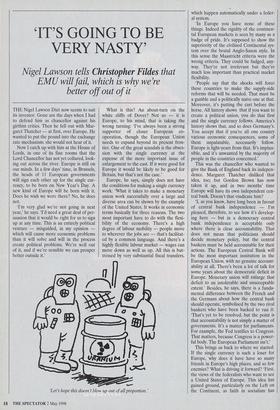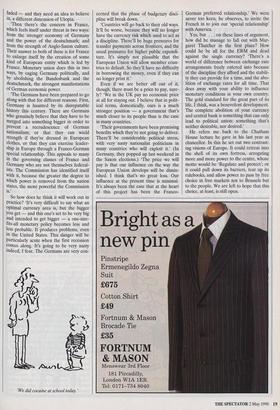`IT'S GOING TO BE VERY NASTY'
EMU will fail, which is why we're better off out of it
THE Nigel Lawson Diet now seems to suit its inventor. Gone are the days when I had to defend him as chancellor against his girthist critics. Then he fell out with Mar- garet Thatcher — at first, over Europe. He wanted to put the pound into the exchange rate mechanism: she would not hear of it.
Now I catch up with him at the House of Lords, in one of its fine rooms that the Lord Chancellor has not yet collared, look- ing out across the river. Europe is still on our minds. In a few days' time, in Brussels, the heads of 11 European governments will sign each other up for the single cur- rency, to be born on New Year's Day. A new kind of Europe will be born with it. Does he wish we were there? No, he does not.
`I'm very glad we're not going in next year,' he says. 'I'd need a great deal of per- suasion that it would be right for us to sign up at any time. This is an entirely political venture — misguided, in my opinion which will cause more economic problems than it will solve and will in the process create political problems. We're well out of it, and if we're sensible we can prosper better outside it.' What is this? An about-turn on the white cliffs of Dover? Not so — it is Europe, to his mind, that is taking the wrong turning: 'I've always been a strong supporter of closer European co- operation, though the European Union needs to expand beyond its present fron- tier. One of the great scandals is the obses- sion with the single currency at the expense of the more important issue of enlargement to the east. If it were good for Europe it would be likely to be good for Britain, but that's not the case.'
Europe, he says, simply does not have the conditions for making a single currency work: 'What it takes to make a monetary union work successfully over a large and diverse area can be shown by the example of the United States. It works in economic terms basically for three reasons. The two most important have to do with the flexi- bility of the economy. There's a high degree of labour mobility — people move to wherever the jobs are — that's facilitat- ed by a common language. And there's a highly flexible labour market — wages can move down as well as up. All this is but- tressed by very substantial fiscal transfers, `Let's hope this doesn't blow up out of all proportion.' which happen automatically under a feder- al system.
`In Europe you have none of these things. Indeed the rigidity of the continen- tal European markets is seen by many as a badge of pride. It's supposed to show the superiority of the civilised Continental sys- tem over the brutal Anglo-Saxon style. In this sense the Maastricht criteria were the wrong criteria. They could be fudged, any- way. They're not irrelevant but they're much less important than practical market
flexibility.
`People say that the shocks will force these countries to make the supply-side reforms that will be needed. That must be a gamble and a politically naive one at that. Moreover, it's putting the cart before the horse. All history shows that if you want to create a political union, you do that first and the single currency follows. America's history shows that, and so does Germany's. You accept that if you're all one country various economic consequences, some of them unpalatable, necessarily follow. Europe is light-years from that. It's implau- sible, and it's unwanted by the majority of people in the countries concerned.'
This was the chancellor who wanted to give the Bank of England back its indepen- dence. Margaret Thatcher disliked that idea, too; but Gordon Brown has now taken it up, and in two months' time Europe will have its own independent cen- tral bank. Doesn't that vindicate him?
`I, as you know, have long been in favour of central bank independence — I'm pleased, therefore, to see how it's develop- ing here — but in a democracy central bank independence is acceptable only where there is clear accountability. That does not mean that politicians should decide monetary policy, but the central bankers must be held accountable for their actions. The European Central Bank will be the most important institution in the European Union, with no genuine account- ability at all. There's been a lot of talk for some years about the democratic deficit in Europe. Monetary union will enlarge that deficit to an intolerable and unacceptable extent.' Besides, he says, there is a funda- mental difference between the French and the Germans about how the central bank should operate, symbolised by the two rival bankers who have been backed to run it: `That's yet to be resolved, but the point is that accountability is not simply a matter of governments. It's a matter for parliaments. For example, the Fed testifies to Congress. That matters, because Congress is a power- ful body. The European Parliament isn't.'
This brings us back to where we started. If the single currency is such a loser for Europe, why does it have have so many friends in Europe's high places, and so few enemies? What is driving it forward? 'First, the views of the federalists who want to see a United States of Europe. This idea has gained ground, particularly on the Left on the Continent, as faith in socialism has faded — and they need an idea to believe in, a different dimension of Utopia.
`Then there's the concern in France, which feels itself under threat in two ways: from the stronger economy of Germany and the power of the deutschmark; and from the strength of Anglo-Saxon culture. Their answer to both of these is for France to enlarge itself by the creation of some kind of European entity which is led by France. Monetary union does this in two ways, by caging Germany politically, and by abolishing the Bundesbank and the deutschmark, the strongest manifestations of German economic power.
`The Germans have been prepared to go along with that for different reasons. First, Germany is haunted by its disreputable history this century. There are Germans who genuinely believe that they have to be merged into something bigger in order to prevent a recrudescence of German nationalism; or that they can wield strength if they're dressed in European clothes, or that they can exercise leader- ship in Europe through a Franco-German special relationship. This appeals to many in the governing classes of France and Germany who are not themselves federal- ists. The Commission has identified itself with it, because the greater the degree to which power is removed from the nation states, the more powerful the Commission So how does he think it will work out in practice? 'It's very difficult to say what an optimal currency area is, but the bigger you get — and this one's set to be very big and intended to get bigger — a one-size- fits-all monetary policy becomes less and less probable. It produces problems, even in the United States. This danger will be particularly acute when the first recession comes along. It's going to be very nasty indeed, I fear. The Germans are very con- `We did cocaine at school today.' cemed that the phase of budgetary disci- pline will break down.
`Countries will go back to their old ways. It'll be worse, because they will no longer have the currency risk which used to act as a discipline. There'll be huge pressures for transfer payments across frontiers, and the usual pressures for higher public expendi- ture. It's simply not plausible that the European Union will allow member coun- tries to default. So they'll have no difficulty in borrowing the money, even if they can no longer print it.'
Even if we are better off out of it, though, there must be a price to pay, sure- ly? 'We in the UK pay no economic price at all for staying out. I believe that in polit- ical terms, domestically, ours is a much stronger position — a government that's much closer to its people than is the case in many countries.
`Their governments have been promising benefits which they're not going to deliver. There'll be considerable political stress, with very nasty nationalist politicians in many countries who will exploit it.' (In Germany, they popped up last weekend in the Saxon elections.) 'The price we will pay is that our influence on the way the European Union develops will be dimin- ished. I think that's no great loss. Our influence at the present time is minimal, It's always been the case that at the heart of this project has been the Franco- German preferred relationship.' We were never too keen, he observes, to invite the French in to join our 'special relationship' with America.
Yes, but . . . on these lines of argument, how did he manage to fall out with Mar- garet Thatcher in the first place? How could he be all for the ERM and dead against the single currency? 'There's a world of difference between exchange rate arrangements freely entered into because of the discipline they afford and the stabili- ty they can provide for a time, and the abo- lition of exchange rates for all time. That does away with your ability to influence monetary conditions in your own country. The gold standard for the great part of its life, I think, was a benevolent development. The complete abolition of your currency and central bank is something that can only lead to political union: something that's neither desirable, nor desired.'
He refers me back to the Chatham House lecture he gave in his last year as chancellor. In this he set out two contrast- ing visions of Europe. It could retreat into the shell of its own fortress, arrogating more and more power to the centre, whose motto would be `Regulate and protect'; or it could pull down its barriers, tear up its rulebooks, and allow power to pass by free choice in free markets not to Brussels but to the people. We are left to hope that this choice, at least, is still open.



























































 Previous page
Previous page